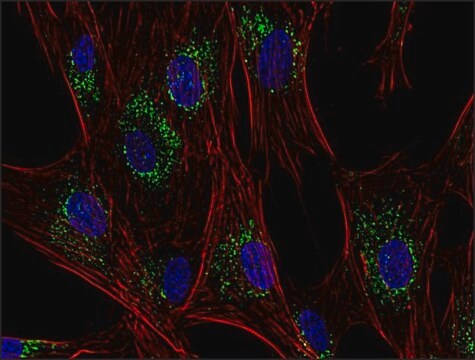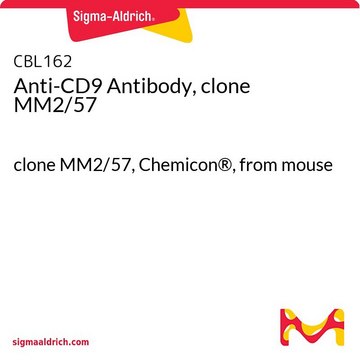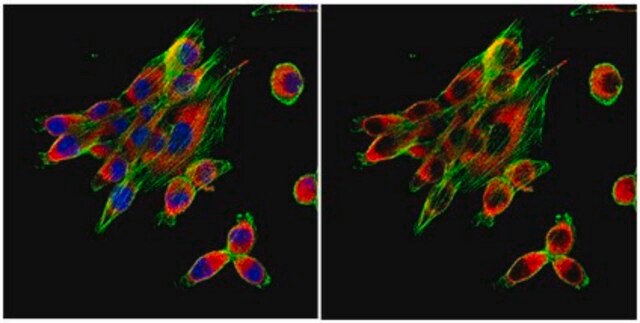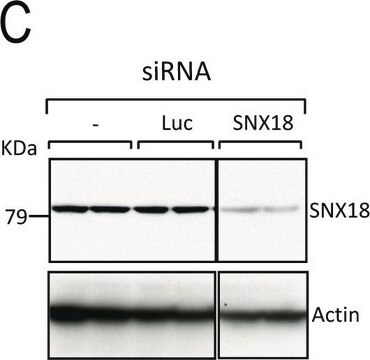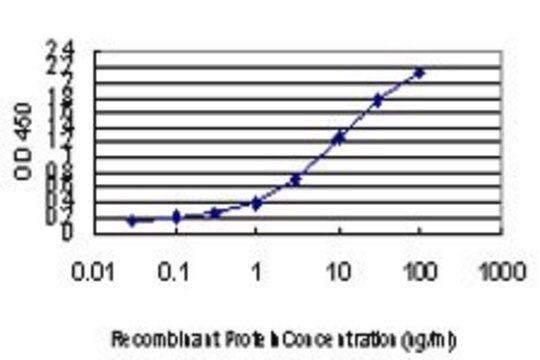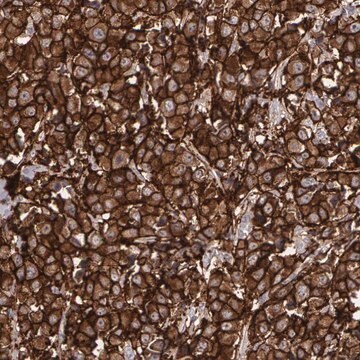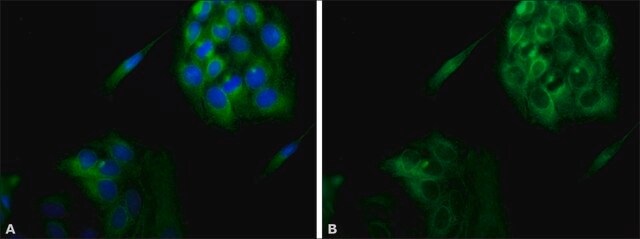SAB4700092
Monoclonal Anti-CD9 antibody produced in mouse
clone MEM-61, purified immunoglobulin, buffered aqueous solution
Autenticatiper visualizzare i prezzi riservati alla tua organizzazione & contrattuali
About This Item
Codice UNSPSC:
12352203
NACRES:
NA.41
Prodotti consigliati
Origine biologica
mouse
Livello qualitativo
Coniugato
unconjugated
Forma dell’anticorpo
purified immunoglobulin
Tipo di anticorpo
primary antibodies
Clone
MEM-61, monoclonal
Stato
buffered aqueous solution
Reattività contro le specie
human
Concentrazione
1 mg/mL
tecniche
flow cytometry: suitable
Isotipo
IgG1
N° accesso NCBI
N° accesso UniProt
Condizioni di spedizione
wet ice
Temperatura di conservazione
2-8°C
modifica post-traduzionali bersaglio
unmodified
Informazioni sul gene
human ... CD9(928)
Descrizione generale
CD9 (cluster of differentiation 9) is a human cell surface antigen. CD9 gene contains 8 exons extending over a length of 20kb on genomic DNA.The gene is mapped to human chromosome 2q12-pter. The encoded protein has a molecular weight of 24kDa and is expressed mainly on B-lineage-derived acute lymphoblastic leukemia cells and developing B lymphocytes.The protein is also present in blood platelets, neuroblastoma cell lines, normal and transformed epithelia, peripheral glia and neurons. CD9 antigen belongs to the transmembrane 4 superfamily (TM4SF) and is characterized with two external loops and four hydrophobic domains of membrane-spanning length.
Immunogeno
Pre-B cell line NALM-6
Applicazioni
The reagent is designed for Flow Cytometry analysis. Suggested working dilution for Flow Cytometry is 5 μg/mL of sample. Indicated dilution is recommended starting point for use of this product. Working concentrations should be determined by the investigator.
Azioni biochim/fisiol
Members of transmembrane 4 superfamily (TM4SF) including CD9 (cluster of differentiation 9) plays a vital role in cell proliferation, activation, motility and tumor cell metastasis. CD9 facilitates platelet activation and aggregation. The encoded protein also plays a major role in the amplification of a motorgenic signal in B cells includingβ1 integrins and the activation of protein tyrosine kinases. CD9 interacts with GM3 and downregulates tumor cell motility. CD9 and CD81 stimulate muscle cell fusion and aids in myotube maintenance.
Caratteristiche e vantaggi
Evaluate our antibodies with complete peace of mind. If the antibody does not perform in your application, we will issue a full credit or replacement antibody. Learn more.
Stato fisico
Solution in phosphate buffered saline, pH 7.4, with 15 mM sodium azide.
Esclusione di responsabilità
Unless otherwise stated in our catalog or other company documentation accompanying the product(s), our products are intended for research use only and are not to be used for any other purpose, which includes but is not limited to, unauthorized commercial uses, in vitro diagnostic uses, ex vivo or in vivo therapeutic uses or any type of consumption or application to humans or animals.
Non trovi il prodotto giusto?
Prova il nostro Motore di ricerca dei prodotti.
Codice della classe di stoccaggio
10 - Combustible liquids
Punto d’infiammabilità (°F)
Not applicable
Punto d’infiammabilità (°C)
Not applicable
Scegli una delle versioni più recenti:
Possiedi già questo prodotto?
I documenti relativi ai prodotti acquistati recentemente sono disponibili nell’Archivio dei documenti.
Ectopic expression of human and feline CD9 in a human B cell line confers beta 1 integrin-dependent motility on fibronectin and laminin substrates and enhanced tyrosine phosphorylation.
Shaw AR
The Journal of Biological Chemistry, 270, 24092-24099 (1995)
GM3 ganglioside inhibits CD9-facilitated haptotactic cell motility: coexpression of GM3 and CD9 is essential in the downregulation of tumor cell motility and malignancy.
Ono M
Biochemistry, 40, 6414-6421 (2001)
Yibei Dai et al.
Frontiers in oncology, 11, 777684-777684 (2021-12-14)
Prostate cancer (PCa) is one of the most frequently diagnosed cancers and the leading cause of cancer death in males worldwide. Although prostate-specific antigen (PSA) screening has considerably improved the detection of PCa, it has also led to a dramatic
Mayela Mendt et al.
JCI insight, 3(8) (2018-04-20)
Exosomes are extracellular vesicles produced by all cells with a remarkable ability to efficiently transfer genetic material, including exogenously loaded siRNA, to cancer cells. Here, we report on a bioreactor-based, large-scale production of clinical-grade exosomes employing good manufacturing practice (GMP)
Assignment to chromosome 12 of the gene coding for the human cell surface antigen CD9(p24) using the monoclonal antibody ALB6.
Boucheix C
Annales De Genetique, 28, 19-24 (1985)
Global Trade Item Number
| SKU | GTIN |
|---|---|
| SAB4700092-100UG | 4061832705811 |
Il team dei nostri ricercatori vanta grande esperienza in tutte le aree della ricerca quali Life Science, scienza dei materiali, sintesi chimica, cromatografia, discipline analitiche, ecc..
Contatta l'Assistenza Tecnica.